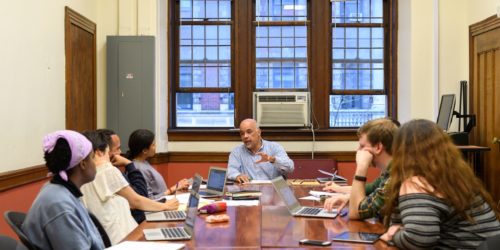Current Students: Looking for your degree requirements? Visit the Academic Resources on the Registrar Page.
 The Master of Arts in Religion (MA) is a two-year academic degree (51 credit) that prepares students for a variety of professional positions by providing a basic understanding of theological disciplines related to the interests of study. Students must specify an area of concentration as approved by the faculty advisor to the program.
The Master of Arts in Religion (MA) is a two-year academic degree (51 credit) that prepares students for a variety of professional positions by providing a basic understanding of theological disciplines related to the interests of study. Students must specify an area of concentration as approved by the faculty advisor to the program.
Our MA program offers both full-time residential and part-time commuter options, all within an intellectually challenging, dynamic and justice-minded community. While the MA is a primarily academic degree that prepares students for advanced studies and teaching, it also prepares students for a variety of other professional positions in diverse academic and non-academic contexts.
Scholarship and Justice:
Union’s curriculum intentionally engages societal disparities based on gender, race, sexuality, religion, and other divisive or marginalizing forces. Studying in this environment is both a strength and a challenge. Union graduates emerge from the program equipped to respond to the claims of the world with intellectual excellence, social justice, and compassionate wisdom.
Review the Application Procedures and Deadlines before you apply.
Apply Today
A Program as Flexible as You Are:
Students come to Union with diverse religious backgrounds, academic interests, and vocational aspirations so our curriculum is designed with a wide variety of options for selecting a concentration. MA students are advised to declare a concentration during the first year of their program.
Possible Concentrations
Bible/Old Testament | Bible/New Testament | Bible/Cross-Testament | Buddhism & Interreligious Engagement | Church History/Historical Studies | Interreligious Engagement | Islam & Interreligious Engagement | Psychology & Religion | Religion & Black Experience | Religion & Society | Social Ethics | Theological Studies | Theology and the Arts | Interdisciplinary: Other (approved by an advisor and MA director)
Sample Classes:
This course introduces the field of interreligious engagement through readings, site visits, spiritual practices, and
self-reflection. It aims to cultivate understanding of the phenomenon of religious diversity, central questions and
concerns that arise in relation to religious diversity, and prominent approaches to interreligious engagement.
Study of the origins and development of social ethics as a discipline, focusing on methodological, contextual, and
"framing" issues. Chief historical paradigms include social gospel ethics, Christian realism, liberationist and
feminist ethics, and Roman Catholic, black church, and evangelical social ethics.
This course explores the social, ethical and religious implications of some of the rapidly proliferating technological developments in the field of Artificial Intelligence (AI). In the interest of equipping faith leaders for the crucial work of applying the ethical insights of our respective religious traditions to crucial and urgent social questions, we begin asking questions such as: What is AI? What are its possibilities and limitations? What are some of the social ethical, spiritual, and religious implications of its widespread adoption-including its profound effects on
economics, surveillance, healthcare, politics, and nearly every aspect of human life?
This course is designed for students who intend to deepen their philosophical and sociological understanding of religion. After exploring the "masters of suspicion" (Feuerbach, Marx, Nietzsche, Freud), we engage Antonio
Gramsci's theory of hegemony and WEB Du Bois' sociological analysis of the Black Church. We explore how Pierre Bourdieu's theory of "habitus" and "social field" can be used for a social analysis of religious attitudes. Students are acquainted with philosophies that focus on religions’ "utopian" dimensions (Ernst Bloch) and the "messianic" components of our life practices (Walter Benjamin, Jacques Derrida). We explore different and conflicting feminist approaches to religion and look at the relationship between anticolonialism, postcolonialism and decoloniality. What can we learn from the different critical theories for a more comprehensive engagement with religion(s) and religious movements?
